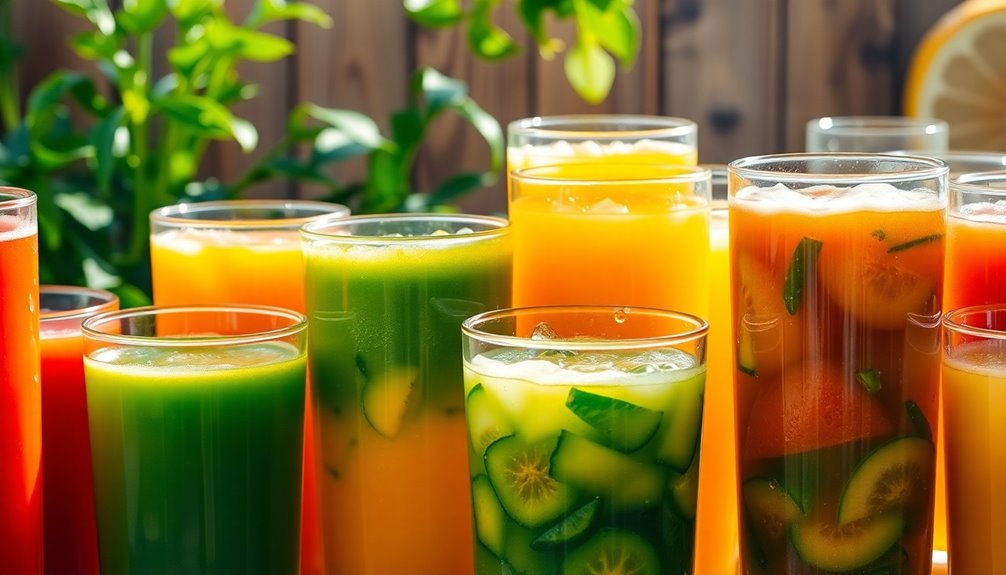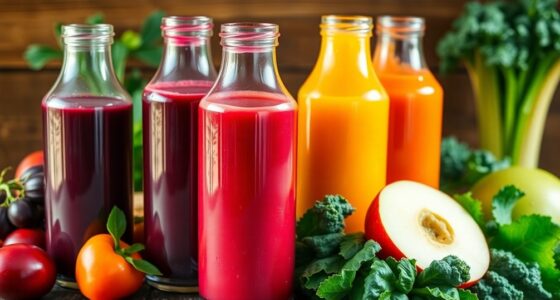Freshly squeezed juices offer a wealth of nutrients. Each cup typically contains 100 to 120 calories, packed with natural sugars and essential vitamins like vitamin C and folate. They’re low in fiber but rich in antioxidants, which support your immune system and protect against oxidative stress. Plus, they’re easy to digest, enhancing nutrient absorption. If you’re curious about the specific benefits of different juices and how to maximize their value, there’s plenty more to explore. Incorporating a variety of fruits and vegetables into your freshly squeezed juices can amplify their health benefits, offering a diverse range of vitamins and minerals. For instance, adding leafy greens can boost the nutritional profile significantly, while citrus fruits enhance flavor and vitamin C content. By understanding the freshly squeezed juice nutritional benefits, you can tailor your juice selections to meet your specific health goals and preferences.
Key Takeaways
- Freshly squeezed juices contain 100 to 120 calories per cup, primarily from natural sugars and carbohydrates.
- High in vitamin C, these juices support immune function and overall health.
- Fresh juices retain more nutrients compared to processed varieties, especially vitamin C and flavanones.
- They are low in fiber unless pulp is included, but rich in micronutrients like potassium and folate.
- Antioxidants in fresh juices help combat oxidative stress and promote cardiovascular health.
Nutritional Content of Freshly Squeezed Juices
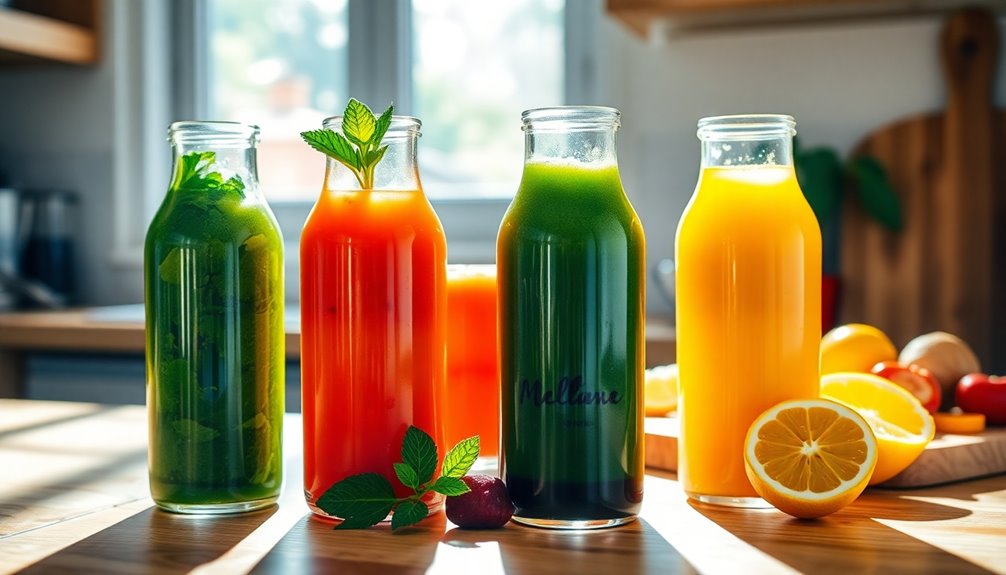
When you enjoy a glass of freshly squeezed juice, you're not just savoring the flavor; you're also consuming a concentrated source of nutrients.
With about 100 to 120 calories per cup, these juices are calorie-dense, primarily due to their natural sugar content. For example, orange juice packs around 21 grams of sugar and 26 grams of carbohydrates per cup.
While they're low in fiber unless pulp is included, they offer minimal protein and are fat-free. Fresh juices shine in their micronutrient profile, delivering a hefty dose of vitamin C, folate, and potassium. Additionally, freshly squeezed orange juice retains more nutrients compared to store-bought varieties. Notably, juices like beet juice can enhance blood flow and provide additional health benefits.
Though they may lack the fiber found in whole fruits, their rich nutrient content makes them a popular choice for a quick, refreshing boost. Many people turn to fresh juices as a convenient way to incorporate more vitamins and minerals into their diets. The nutritional benefits of fresh juices are well-documented, providing an array of antioxidants that can support overall health. Additionally, these juices can be tailored to individual taste preferences, making it easy to experiment with different combinations of fruits and vegetables for a tailored health boost.
Health Benefits of Freshly Squeezed Juices
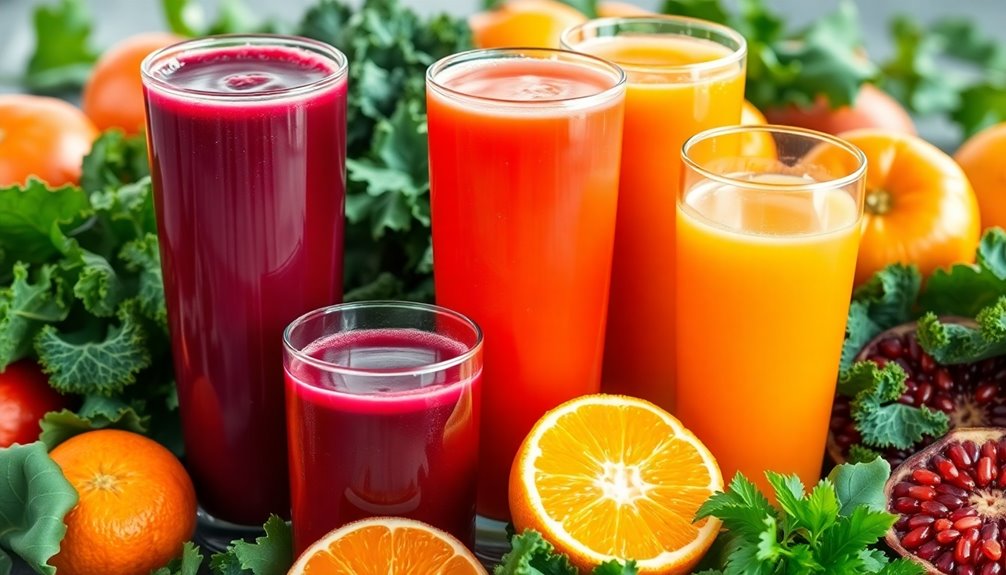
Freshly squeezed juices offer a wealth of health benefits that can enhance your overall well-being. They support digestive health by providing soluble fiber, which promotes good bacteria growth and regulates blood sugar levels. More fiber in these juices also slows the transit of food through the digestive tract, contributing to a feeling of fullness.
These juices are easy to digest, making nutrient intake seamless while avoiding digestive issues. Rich in vitamin C, they boost your immune system, helping prevent colds and flu.
The antioxidants protect your cells from damage, while also improving iron absorption. Additionally, fresh juices keep you hydrated and energized with natural sugars, supporting healthy skin and kidney function.
Finally, the antioxidants and potassium found in these juices promote cardiovascular health, protecting against chronic diseases and ensuring your heart stays strong.
Comparison to Processed Juices
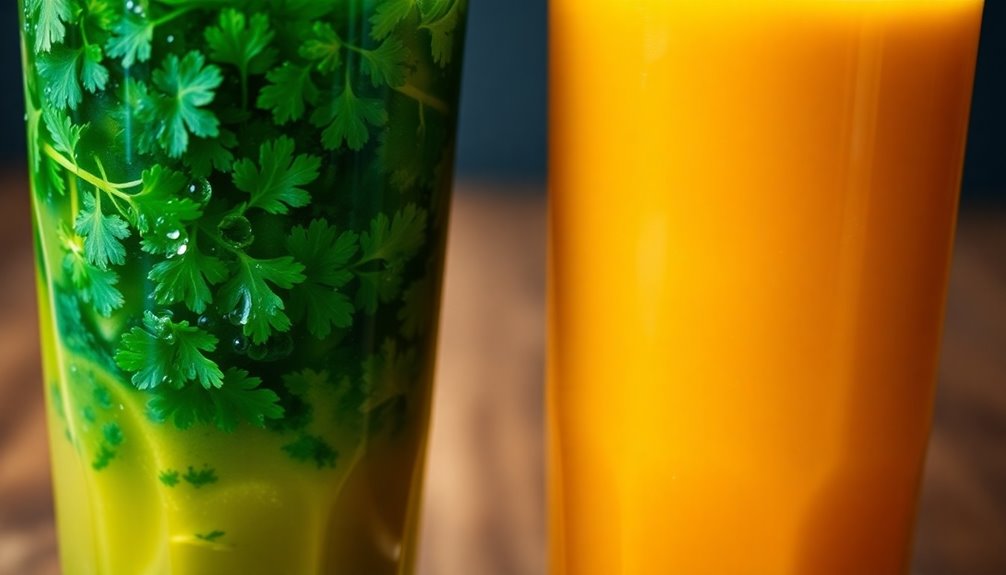
Freshly squeezed juices usually boast higher vitamin C levels, thanks to less exposure to heat and oxygen. However, processed juices might retain more polyphenols due to efficient mechanical juicing methods. This is because packaged juice shows three times more hesperetin in blood samples than fresh juice. Additionally, the high fiber content in freshly squeezed juices can also contribute to better digestive health, similar to the benefits offered by chia seeds.
You'll find similar mineral content, like potassium, in both types. Freshly squeezed options typically offer more flavanones, especially if consumed right after preparation.
On the flip side, pasteurization in processed juices helps maintain vitamin C levels, making them a reliable choice too.
Ultimately, when choosing between them, consider your nutrient priorities and preferences for taste and freshness.
Preparation and Consumption Guidelines

Choosing to enjoy freshly squeezed juice means you'll want to know the best ways to prepare and consume it to get the most nutrients. Start by selecting juicy oranges, like Valencia or Navel varieties, as they provide the best juice yield. You can use a citrus juicer for efficiency or blend without peels for extra fiber. If you're short on time, briefly microwaving the fruit can help release more juice. Additionally, incorporating fresh herbs like mint or basil can enhance the flavor and nutritional profile of your juice.
Always aim to drink your juice immediately for maximum benefits, but if you need to store it, refrigerate in a tightly sealed container for up to three days or freeze for longer preservation.
Nutritional Variability Among Juices
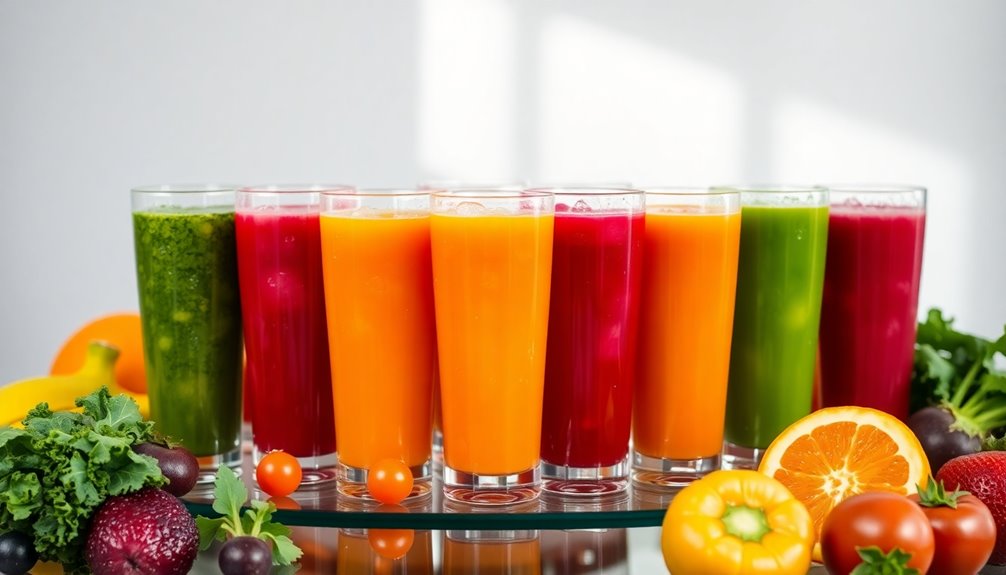
The nutrient content of freshly squeezed juices can vary significantly based on the type of fruit or vegetable used. For instance, citrus juices are packed with vitamin C, while carrot juice shines with its vitamin A and beta-carotene. Darker fruits and vegetables, like berries, boast higher antioxidant levels, protecting your cells from damage. Fresh juices also retain beneficial minerals like potassium and magnesium that contribute to your daily intake. Plus, the soluble fiber in fresh juices helps regulate your blood sugar and supports digestion. Additionally, juicing breaks down plant cell walls, which enhances nutrient availability for better absorption. Many juices, such as celery juice, are celebrated for their anti-inflammatory properties, which can further support overall health.
Economic and Environmental Impact
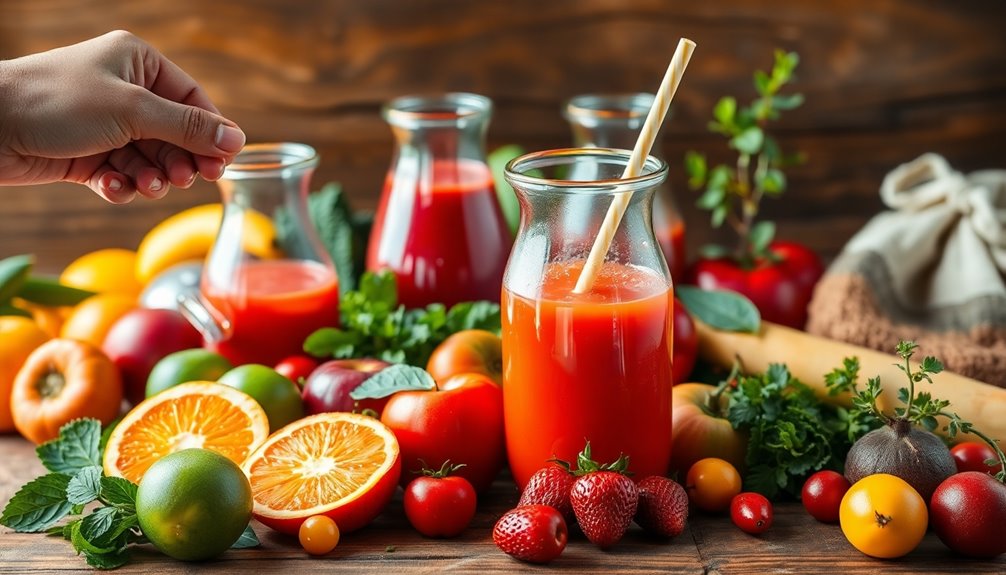
As the demand for freshly squeezed juices continues to rise, their economic and environmental impacts become increasingly significant.
You should know that the U.S. fruit and vegetable juice industry supports over 224,000 jobs and generates $45.54 billion in annual revenue. This growth is evident in the cold-pressed juice market, which is projected to reach $1,028 million by 2025. Additionally, freshly squeezed juices provide essential nutrients, including vitamin C, which are linked to reducing risks of heart disease. Engaging in low-impact exercises like hula hooping can further enhance your health while incorporating nutritious juices into your diet.
Environmentally, freshly squeezed juices contribute to food waste reduction and require minimal resources compared to industrial processing. Supporting local juice production also cuts transportation emissions.
As consumer preferences lean toward health and sustainability, the juice industry not only enhances your well-being but also fosters economic growth and environmental responsibility.
Popular Types of Freshly Squeezed Juices
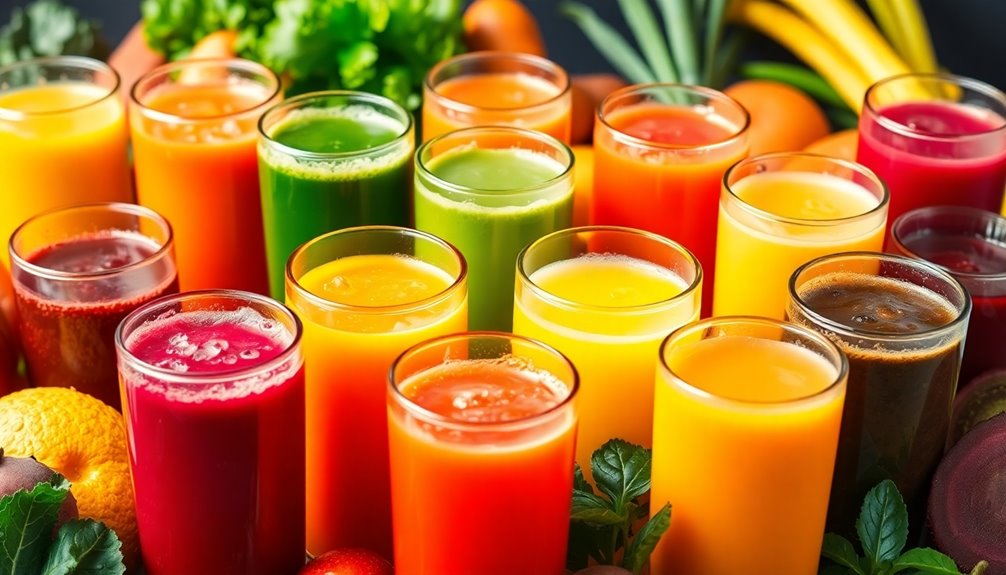
With countless varieties available, freshly squeezed juices offer something for everyone. You might enjoy classic orange juice packed with vitamin C or apple juice, which is high in antioxidants and fiber. Fresh squeezed juices contain higher levels of antioxidants compared to processed juices, making them a healthier choice. Additionally, making a paper boat can be a fun activity for children while they enjoy their juice.
If you're feeling adventurous, try mango juice for its vitamins A and C. Grapefruit juice may aid in weight management, while pineapple juice is celebrated for its anti-inflammatory benefits.
On the vegetable side, carrot juice boosts your vision with vitamin A, and celery juice is perfect for digestion. Beet juice can help lower blood pressure, while kale juice is a powerhouse of vitamins. For something tropical, coconut water hydrates with electrolytes, and pomegranate juice supports heart health.
Each option brings unique benefits to your daily routine!
Tips for Maximizing Juice Nutrients

To get the most out of your freshly squeezed juices, focus on how and when you consume them.
Drink your juice on an empty stomach to boost nutrient absorption, and avoid mixing it with meals to prevent digestive competition. Immediate consumption maximizes health benefits and ensures you enjoy the best flavor. Incorporating ingredients high in vitamins A, C, and K can further enhance the nutritional profile of your juices.
If you can't consume it right away, freeze your juice in airtight containers to retain about 95% of its enzyme value.
Always opt for organic produce to minimize pesticide exposure and enhance nutrition.
For better yield, alternate between soft and hard ingredients, and consider adding citrus fruits.
Lastly, consume your juice immediately for optimal flavor and nutrients, and keep it away from direct sunlight to prevent degradation.
Frequently Asked Questions
How Do I Choose the Best Juicer for Home Use?
When choosing the best juicer for home use, consider your needs and preferences.
If you want speed, a centrifugal juicer might be for you. For better nutrient retention, opt for a masticating or cold press juicer.
Think about your budget, size, and ease of cleaning too. If versatility is important, a bluicer could be ideal.
Always check for warranty and support to ensure you're making a wise investment for your kitchen.
Can I Juice Frozen Fruits and Vegetables?
Juicing frozen fruits and veggies might sound tempting, but you've gotta thaw them first!
Thawing ensures you get the best blend of nutrients and flavors when you juice. If you toss them in frozen, you risk damaging your juicer and losing out on taste.
While frozen produce is convenient and retains nutrients well, fresh ingredients often deliver a more vibrant flavor.
What Is the Shelf Life of Freshly Squeezed Juice?
The shelf life of freshly squeezed juice varies based on the type and storage conditions.
Generally, orange juice lasts 2-3 days in the fridge, while vegetable juices may only last 24 hours. If you store it properly in airtight containers and keep it cold, you can extend its freshness.
Cold-pressed juice typically lasts 3-5 days. For long-term storage, consider freezing, which can preserve juice for 12-16 months with minimal nutrient loss.
Are There Any Health Risks Associated With Juicing?
Yes, there are health risks associated with juicing. Unpasteurized juices can harbor harmful pathogens like *E. coli* and *Salmonella*, especially if you're part of a vulnerable group.
Juicing also removes most of the fiber, which is vital for digestion, and can lead to nutrient imbalances. Additionally, excessive juice consumption might raise oxalate levels, affecting kidney health.
Always weigh these risks against the benefits before making juicing a regular part of your diet.
How Can I Incorporate Fresh Juice Into My Diet?
Imagine a vibrant rainbow spilling into your glass, each hue brimming with life.
To incorporate fresh juice into your diet, start your mornings with a refreshing juice blend, awakening your senses. Grab a bottle for a midday pick-me-up or drizzle it into salads for added flair.
You could even use it as a meal replacement on busy days. Remember, each sip nourishes your body, turning health into a delicious ritual.
Conclusion
In conclusion, freshly squeezed juices offer a powerhouse of nutrients that can enhance your health. Did you know that just one 8-ounce serving of orange juice can provide over 100% of your daily vitamin C needs? By choosing freshly squeezed over processed options, you're not only boosting your nutrient intake but also reducing additives and preservatives. So, grab your juicer and enjoy the vibrant flavors and health benefits that come from nature's bounty!
Cindy thoroughly researches juicing trends, techniques, and recipes to provide readers with practical advice and inspiration. Her writing style is accessible, engaging, and designed to make complex concepts easy to understand. Cindy’s dedication to promoting the advantages of juicing shines through her work, empowering readers to make positive changes in their lives through the simple act of juicing.

